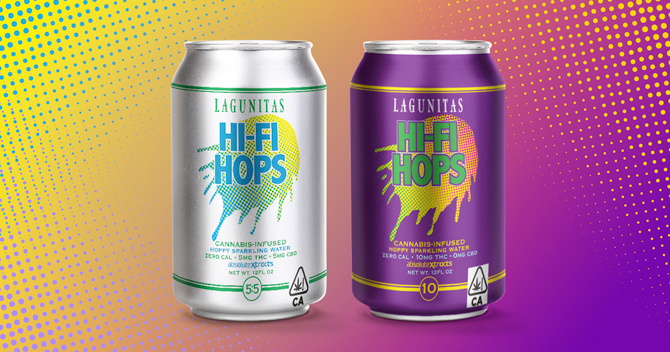
U.S. consumers looking to catch a buzz without the booze will soon be able to purchase an assortment of beer-centric products thanks to a pair of ventures aiming to disrupt the current alcohol market with cannabis-infused beverages.
Petaluma, California-headquartered Lagunitas Brewing Company, which has a well-documented history with marijuana and is now wholly owned by Amsterdam-based Heineken International B.V., today announced the launch of two psychoactive sparkling water products.
Called Hi-Fi Hops, the two “IPA-inspired” non-alcoholic beverages are made in partnership with CannaCraft — which produces the AbsoluteXtracts line of vape cartridges — and contain zero alcohol, zero calories, and zero carbohydrates.
Set to debut at California-licensed dispensaries on July 30, the hoppy sparkling water beverages come in two doses: one containing 5 mg of THC (tetrahydrocannabinol) and 5 mg of CBD (Cannabidiol), and another containing 10 mg of THC.
According to representatives from both companies, who declined to reveal the specific financial terms of their arrangement, Lagunitas will produce the hop-infused, carbonated water and ship the liquid to CannaCraft’s facility in nearby Santa Rosa, California.
CannaCraft will then infuse its emulsified THC and CBD oils into the hoppy water, and package upwards of 25,000 12 oz. cans (about 75 barrels) for distribution throughout California.
Speaking to Brewbound, Lagunitas spokeswoman Karen Hamilton said the products – which prominently display the Lagunitas logo and are branded with the company’s signature splotch moniker — would retail for $8 and have a shelf life of eight months.
“If you are going to do an extension of your brand, it makes sense to create continuity, otherwise there is no connection,” Hamilton said, noting that the two companies hope to build off of Lagunitas’ image as a high-end producer of hoppy beers, as well as its penchant for marijuana as the emerging market for THC-infused beverages, grows.
“There is a pretty big frontier ahead,” she added. “It is an exciting one, and the future is unknown, but we know that Cannabis and CBD will be a big part of it.”
For its part, Heineken approved of Lagunitas’ push into the Cannabis sector, according to spokesman Bjorn Trowery.
“The great thing about Lagunitas is that they are always innovating and pushing the boundaries,” he said. “That’s one of the reasons why we teamed up with them, and something that’s really inspiring us. So, it is important that we let Lagunitas do their thing. Hi-Fi Hops is the latest result of their off-the-beaten-path experimentation.”
Despite doing much of the partnership’s heavy lifting – including supplying the active ingredients and distributing the products throughout the state via its sister company, Kind House Distribution – CannaCraft’s AbsoluteXtracts logo is displayed in much smaller lettering on the cans.
According to Kial Long, vice president of marketing for CannaCraft, which controls about 5 percent of the cannabis market in California, the psychoactive effects of the Hi-Fi Hops offerings will set in as quickly as about 15 minutes and last for as long as three hours.

Meanwhile, Cannabiniers, another Cannabis company that has operations in California and Nevada, last week announced the launch of Two Roots Brewing, which it claims produces “the world’s first line of CannaCrafted non-alcoholic THC and CBD infused craft beer.”
Speaking to Brewbound, Kevin Love, the company’s director of product development, said Two Roots brews its five styles of beer using traditional methods and then strips alcohol from the product using European manufactured “de-alcoholizing” equipment.
Like the Lagunitas offerings, Two Roots’ near beer is then shipped to a Cannabiniers facility and infused with approximately 2.5 mg of emulsified THC.
But the difference between the Two Roots products and the Lagunitas offerings, Love claims, is the infusing method.
While the dosage of the Two Roots products is lower than Hi-Fi Hops, Love said the company’s use of “nano-particulate, water-soluble” THC, as opposed to oil-based THC, allows for greater absorption within a period of five to seven minutes.
“The bioavailability is as high as 50 percent,” he said, noting that the human body takes longer to absorb other oil-based products.
“That’s why we are micro-serving,” he said. “When you were younger, and you had your first beer, you understood what it did. After you try the product, you can understand how many it takes to get to where you want to be.”
The Two Roots products, which are packaged in 10.5 oz. “sleek” cans and come in five flavors — Lager, Stout, New West IPA, Blonde Ale, and Wheat – are set to launch in Nevada in mid-July and will retail for $5.
A California launch is scheduled for the coming months, and the company is also in the process of finalizing contract production partnerships in 12 states, including Colorado, Washington, Illinois and New York, Love added.

Cannabiniers, which raised $19 million as part of a Series A fundraising round, and recently embarked on a $25 million Series B round to fund further expansion, currently employees around 200 people and has 150,000 sq. ft. of cannabis operations, Love added.
The company is bullish on the continued growth of the legal recreational and medical cannabis market in the U.S., which in 2017 totaled about $6 billion, according to Love.
“The entire market of infused beverages is only about 3 percent of total sales,” he said. “But the reality is that the future of cannabis consumption will be in a social environment. And it needs to be consumable, not smokable.”
Love said he believes the growth of “social” use occasions for cannabis – at bars, restaurants or other venues – could eventually mean cannabis-infused beverages make up as much as 30 percent of the total marijuana market.
“That is where the market is heading,” he said. “We are taking the road less traveled and we know it is not going to be an easy one. But we want to claim our stake, and when you are pioneering a market, you stand to have the most value.”
The introduction of cannabis-infused concoctions from Lagunitas and Two Roots Brewing come at a time when traditional beer sales are going flat. According to the Beer Institute, a trade association for the brewing industry, which cited data from Alcohol and Tobacco Tax and Trade Bureau (TTB) during a recent report, domestic tax paid shipments of U.S. beer were down 3.5 percent through May.
Meanwhile, off-premise retail sales of beer, including products imported into the U.S., were down 0.1 percent through May 20, according to market research firm IRI Worldwide.

In their quest to slake consumer thirst for something other than beer, both CannaCraft and Cannabiniers will be up against a growing number of startups, including Blue Moon creator Keith Villa, who plans to launch his own line of cannabis-infused non-alcoholic craft beers under the Ceria Beverages label, and at least two other beer behemoths: Molson Coors and Constellation Brands.
Last week, Bloomberg reported that Molson Coors was in talks with “several” Canadian marijuana companies as it attempts to curb declining beer sales via the introduction of its own line of cannabis-infused beverages.
And last October, Constellation Brands spent $191 million to acquire a 9.9 percent stake in Canada’s Canopy Growth Corporation, an investment that was, in part, aimed at developing cannabis-infused beverages that do not contain alcohol, the Wall Street Journal reported at the time.
The recent uptick in Cannabis-related beverage headlines also comes at a time when President Donald Trump has indicated he would support congressional efforts to end the federal ban on marijuana, and a move by the Food and Drug Administration (FDA), which has approved the prescription of a CBD-based drug to treat epilepsy.